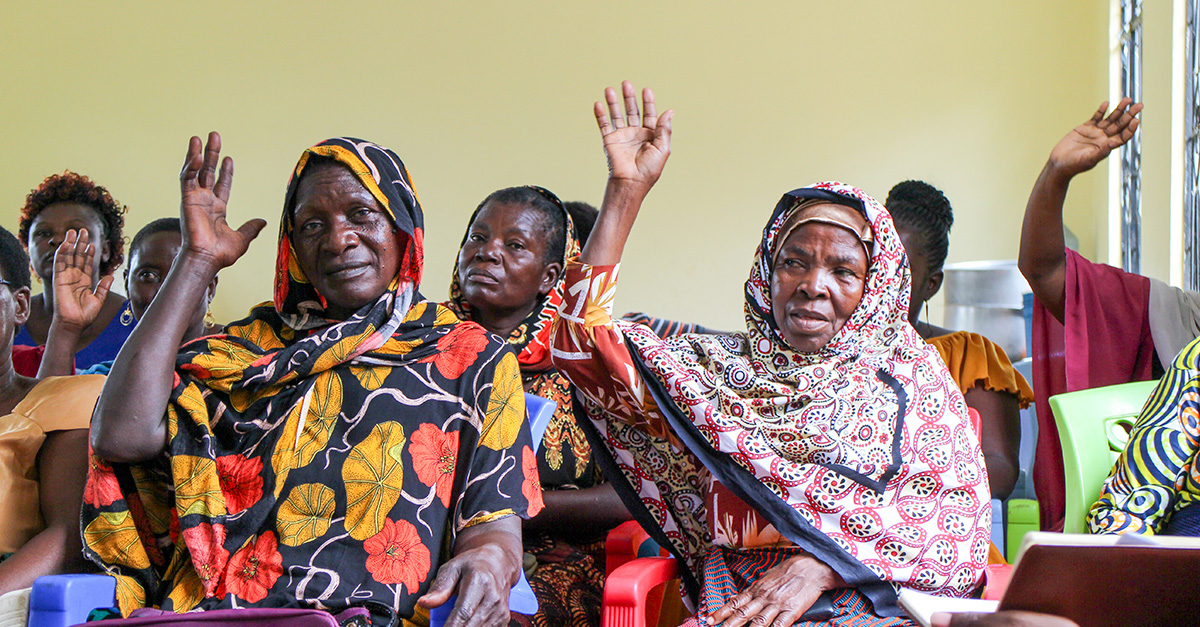“Uskonnolliset toimijat voivat merkittävästi vaikuttaa naisten oikeuksiin ja asemaan yhteiskunnassa, mutta tätä vaikutusvaltaa ei ole riittävästi tunnistettu. Naisten asemaan vaikuttavat monet yhteiskunnalliset ja sosiaaliset normit liittyen esimerkiksi lapsi- ja pakkoavioliittoihin, seksuaali- ja lisääntymisoikeuksiin ja tyttöjen sukuelinten silpomiseen. Uskonnolliset toimijat voivat tehokkaasti vaikuttaa haitallisten tapojen ja käytäntöjen purkamiseksi”, sanoo Lähetysseuran ihmisoikeusasiantuntija Rosa Puhakainen.
Tiedot pohjautuvat tuoreeseen selvitykseen, joka julkaistaan YK:n naisten asemaa käsittelevän toimikunnan kokouksen yhteydessä New Yorkissa 13.3. Transfroming taboos: How to change a social norm -julkistustilaisuudessa ovat keskustelemassa mm. kansanedustaja Eva Biaudet sekä Lähetysseuran ihmisoikeusasiantuntija Rosa Puhakainen.
Rauhantyössä naisten asemaa vaikeuttavat entisestään ihmisoikeuksia ja demokratiaa heikentävät autoritaariset hallitukset, anti-gender-liike ja kansalaisyhteiskunnan toimintatilan kaventuminen. Myös rauhanprosesseissa naiset ovat aliedustettuina: UN Womenin mukaan vain alle 10 prosenttia rauhanneuvottelijoista on naisia, rauhanvälittäjistä heitä on 13,5 prosenttia. Empowering Change: Advancing Women’s Role in Peace and Security -tilaisuudessa puhuu mm. Suomen tasa-arvosuurlähettiläs Katri Viinikka.
Molemmat tilaisuudet ovat torstaina 13.3., ja niitä voi seurata myös etäyhteydellä. Tarkemmat tiedot tilaisuuksista ja ilmoittautumisesta löytyvät alta. Tilaisuuksien kieli on englanti. Tervetuloa mukaan!
Transforming taboos: How to change a social norm
Ajankohta: 13.3. klo 14.15-15.30 (8:15-9:30 New Yorkin aikaa)
Sijainti: Scandinavia House, New York sekä etäyhteys
Tilaisuuden järjestäjät: Suomi, Suomen Lähetysseura, Norja, UN Women, UNFPA, Act-allianssi, Norwegian Church Aid, Act Church of Sweden, Kirkon Ulkomaanapu, Christian Aid, Cordaid, DanChurchAid, Anglican Alliance, Anglican Communion Office, Luterilainen maailmanliitto, World Renew, Kirkkojen maailmanneuvosto
Ilmoittautumislinkki: Transforming Taboos: How to Change a Social Norm
Tapahtuman kuvaus:
As the global community marks the thirtieth anniversary of the Fourth World Conference on Women and adoption of the Beijing Declaration and Platform for Action (1995), this side event amplifies the importance of social norm change to advance gender equality. At times the role that faith-based actors have played in transforming social norms in the implementation of the Beijing Platform for Action has been overlooked, yet they play a critical role in both advancing and hindering progress towards gender equality.
This Side Event launches a new report, which focuses on critical areas of concern such as the human rights of women, women’s access to education, and women in power and decision making. The study maps and analyses the global landscape, including how social norm change by faith-based actors contributes to policy forums, sustainable development programmes and in response to conflict and climate induced crises. Local faith-based actors from diverse regions will share best practices in critical areas of social norm change, for example: Early and Forced Marriage, Sexual and Reproductive Health and Rights, Female Genital Mutilation, Domestic Violence and Family Law and Leadership and Decision-Making.
This side event will illustrate why faith-based actors are critical stakeholders in work for gender equality and why investment in social norm change is essential for achieving the implementation of the Beijing Platform of Action.
Empowering Change: Advancing Women’s Role in Peace and Security
Ajankohta: 13.3.2025 klo 16-17.15 Suomen aikaa (klo 10-11.15 New Yorkin aikaa)
Sijainti: Scandinavia House, New York sekä etäyhteydellä
Tilaisuuden järjestäjät: Suomi, Suomen Lähetysseura, Kolumbia, Norja, Act-allianssi, Cordaid, World Renew, Christian Aid, Luterilainen maailmanliitto, Act Svenska Kyrkan, Anglican Communion Office, Dan Church Aid, Norwegian Church Aid, Kirkon Ulkomaanapu, World YWCA, Soka Gakkai International, Islamic Relief Worldwide, URI, International Academy for Multicultural Cooperation, Women in International Security, Faith to Action Network, Kirkkojen maailmanneuvosto ja Anglican Alliance.
Ilmoittautumislinkki: Advancing women’s role in peace and security
Tapahtuman kuvaus:
The importance of full, equal, and meaningful participation of women in peacebuilding and conflict prevention is acknowledged widely with the adoption of Security Council Resolution 1325. As we mark the 25th anniversary of the UN SCR 1325, women are significantly underrepresented in the peace process and hold less than ten percent of peace negotiator roles and 13.5 percent of mediators are women (UN Women). Yet, studies show that peace agreements with women signatories have higher implementation rates (UN Women).
In the current global context, human rights and democracy are being challenged by countries with authoritarian governments. The anti-gender pushback is becoming increasingly powerful. Simultaneously civic space is shrinking in local, national, regional, and global contexts, limiting the voice and impact of a free and independent civil society in peace negotiations and implementation. This sets additional barriers, particularly to women and girls, who are already facing constraints for equal participation due to patriarchal social norms and do not recognise their full potential and agency.
The New Agenda for Peace underlines the importance of locally led solutions, design, and implementation for sustainable and peaceful transformation in conflict contexts. Local women’s groups, CSOs, communities, youth groups, persons with disabilities, faith-based actors and other local change agents are key actors in the global peacebuilding ecosystem. They have the best knowledge of the attitudes and behaviours in the communities. They can facilitate inside mediation processes and work as role models for more inclusive peace processes when they are given the recognition and space to participate.
Local actors, including faith and other communities, are crucial agents for positive change, as they know the context and solutions. This includes the social, political, and economic inequalities that shape the experiences of violent conflicts. Building comprehensive peace requires constant negotiation, which is perpetual and requires people rooted in the contexts to be resourced and recognised.
The event will discuss the requirements for meaningful implementation of the 1325 resolution by demonstrating concrete examples of increased investment to facilitate diverse participation in peace processes, including women and girls. This will include strategies to reinforce local leadership, including faith-based, in peace-building processes.
* Korjattu 6.3. tasa-arvosuurlähettilään nimi Katri Viinikaksi.

